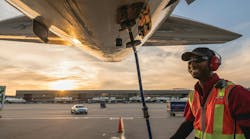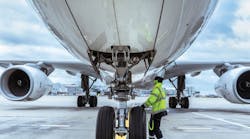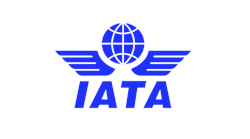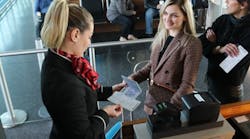Bob Cortelyou has been senior vice president of network planning for Delta Air Lines since 2007. During his tenure, he has been credited with helping the airline make one of the largest network transformations in aviation history after its merger with Northwest Airlines in 2008. Since then he and his network planning team have continued to build a diverse global network by implementing the largest international expansion in the airline's history, with more than 60 new international routes.
Cortelyou spoke with Airport Business magazine about growth in the hubs, what it takes to get air service, investments in airports and future growth.
Airport Business: Delta announced that it was adding seven new cities out of Seattle and that some existing cities were getting more frequencies. Delta started bulking up Seattle back in 2012. What made this city such an appealing market, especially because you have the Salt Lake City hub?
Bob Cortelyou: I would say that Salt Lake City is in the in Rocky Mountains while Seattle is in the Pacific Northwest. Of course, we already served Seattle, so we had a good base to build on. We are a global carrier and there’s no doubt that Seattle deserves a global airline. Delta is there to fulfill that need. So not only do we fly to markets in the Pacific Northwest and West, but we go to China, Japan and Europe. I think the Pacific Northwest continues to grow and it was the perfect time for Seattle to have a global carrier and Delta, of course, is that carrier. It’s been a great success story. And a lot of that has to do with the acceptance of the local community that wants a carrier that can serve all areas of the world from Seattle.
AB: What hubs do you see as having growth prospects in 2017?
BC: The whole industry in the U.S. is doing incredibly well. We're seeing a lot of leisure travel now along with more business traffic. The results are very welcome coming off 2016 into 2017. Where wouldn’t you want to go? There are a lot of opportunities around the country.
AB: For many airports, Delta Connection service may be their best chance to get flights. With all the competition among the airports out there to get that service, what does it take to get your attention these days?
BC: What it takes is more about the economic prospect of an area. We’ve been building up what we call focus cities like Raleigh, [North Carolina] or Boston. We’re building those cities where we see are economic engines with good population growth. When we see all-around strength in those types of cities, we start adding flights. A lot of times it’s not airports that come to us; we are going to airports.
AB: Many airports have teams that do a lot of research and create data that they present to airlines. Of course, the airlines do their own research. What’s the split between the data that Delta uses to research cities and the research that airports and cities present to Delta?
BC: The reality is when a city comes to visit us, we want to know more about the people in that city. We have our numbers and they’ve got theirs. They can hire consultants, but we have our own people here that are going to do the same and have access to even more data. If there is a city that is looking for service, then we want to know what’s happening in that city. What are the people doing? What’s the economy doing?
Airports should be thinking more globally about where we go because we are a large carrier in the U.S. and we serve major domestic markets. On a global scene, there is still a lot of potential out there. And it’s not just for us with our own metal, but through our partnerships. We’ve got our friends at KLM and our Virgin Atlantic partnership that’s been incredibly successful. We just got approval to expand our joint venture with AeroMexico. We also have a strong partnership with GOL in Brazil. We’re working very closely right now in Asia with China Eastern and Korean Air.
It's always fun putting a dot on the map, but it strengthens the overall global picture when we have these important relationships and joint ventures not only for us, but for consumers, who get so many more options.
AB: A lot of cities offer incentives to get airlines to come to their airport. How important are those incentives as part of an overall package to get Delta to come to a city or expand existing service?
BC: It’s not necessarily going to make the decision for us. One of the challenges that incentive programs can have is that they’ll offer us money for service. But at the end of the time, if it’s not working, it’s a bad mark not only on the city and the airport, but also on Delta.
So, it goes back to your original question. We want to know what we expect the outcome of that city is going to before we go. We want to be sure we are going to be a success without incentives. One of the worst things for us would be having to keep going back to an airport and say we need more [money]. That’s not good for Delta or the community.
There are cities that hire consultants who will tell them how to get service and then don’t. The airport director is under pressure from groups like the city council or the airport board. You can throw a lot of money at it, but keep in mind that we don’t like going in and then out. It’s not fair to the cities and it’s not fair to our customers, so I think you’ve got to figure out what really works beforehand.
AB: CEO Ed Bastian spoke about Delta spending $3 billion on the new terminal at LaGuardia Airport, along with spending money to upgrade Terminals 2 and 3 at LAX and the Minneapolis-St. Paul hub. Why are these investments so important?
BC: These investments are important for us because we have the growth, but we also have to have an experience for our customers that is good. We don’t want them to be in crowded terminals or places where they are unhappy. We want to have the conveniences that travelers are looking for. If you look at us, we have airport investment projects going on almost everywhere. LaGuardia is happening and at Los Angeles, we are actually moving and renovating. We’re moving from T5 and T6 over to T2 and T3, and we will be renovating them. We have a big project in Seattle and Salt Lake City is building a new terminal.
We need to be out there for future capacity growth. And more importantly, it's needed for the travel experience for our customers. And for our employees, it feels much better working in a new terminal. You probably feel that way too. If you walk through a new terminal it makes your day a bit brighter.
AB: What are your priorities for 2017 going into 2018?
BC: We’re going to keep building on all the cornerstones that we have, whether it be our network or our operational performance. We’re also going to continue to invest in products, people and our customers. There’s so many areas for us to go. Delta is in a great position for the future and 2017 is going to be a great year.




